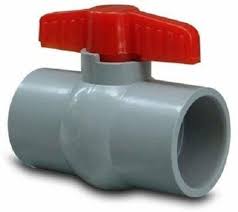PVC ball valves are pivotal components in plumbing systems, renowned for their durability, versatility, and reliability in controlling the flow of fluids. Constructed from polyvinyl chloride, these valves offer a range of features that make them indispensable across various applications.
The PVC ball valve stands out due to its corrosion-resistant properties, making it ideal for handling a diverse array of liquids, including water, chemicals, and corrosive substances. This corrosion resistance ensures longevity, making PVC ball valves suitable for both indoor and outdoor applications.
One of the defining features of PVC ball valve is their ability to provide tight shut-off. The spherical disc inside the valve, manipulated by a handle, offers a quarter-turn operation that swiftly controls the flow, enabling users to precisely regulate the liquid’s movement.
Moreover, the PVC material used in these valves makes them lightweight and easy to install. Their versatility extends to various temperature ranges, allowing for effective operation in both hot and cold environments without compromising performance.
In plumbing systems, PVC ball valves are widely used for their ability to control water flow in residential, commercial, and industrial settings. They are commonly employed in irrigation systems, swimming pool installations, and aquarium setups due to their resistance to chemical degradation.
Their adaptability to different piping systems, including threaded or solvent weld connections, adds to their versatility. This flexibility in connection types allows for easy integration into existing plumbing setups or new installations.
In industrial applications, PVC ball valves find use in chemical processing plants, wastewater treatment facilities, and manufacturing units. Their resistance to chemical corrosion and their capability to handle diverse fluids make them indispensable in these environments.
Additionally, PVC ball valves are a preferred choice for applications where sanitation is crucial, such as in food processing and pharmaceutical industries. The smooth surface and non-toxic properties of PVC ensure that the fluids being transported remain uncontaminated.
In essence, the features of PVC ball valves, including their corrosion resistance, ease of installation, and adaptability to various environments, solidify their position as essential components in plumbing systems across residential, commercial, and industrial settings. Their reliable performance and durability make them a go-to choice for fluid control in diverse applications.



